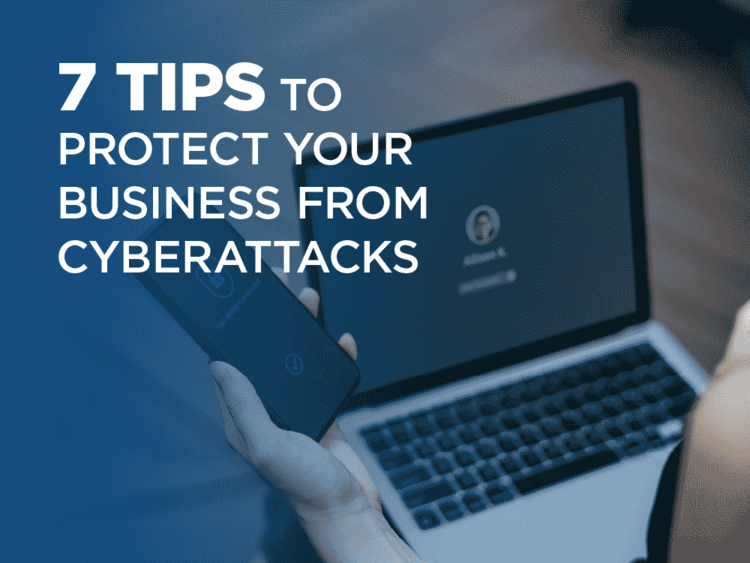
October is a month dedicated to a subject that, if ignored, can be far scarier than any trick-or-treater knocking on the door—cybersecurity. Improving your defenses against cyberattacks doesn’t have to be daunting. There are several simple solutions to protect your business’s data and keep your employees, customers and finances safe online.
What is a Cyberattack?
First, let’s make sure we’re all on the same page. A cyberattack is an unauthorized attempt to expose, destroy or access your data. The two most common types of cyberattacks are:
- Malware—short for “malicious software,” malware acts against the intent of the user and can come in the form of a virus, Trojan horse or worm.
- Phishing—this is when scammers send fraudulent emails or text messages that may look like they’re from a reputable company. Phishing scams often tell you to click a link or open an attachment and can then steal sensitive data.
Smaller organizations are often prime targets for cyberattacks because they aren’t protected by the same level of security infrastructure as larger companies—yet they still have valuable data to offer. Untangling the aftermath of a cyberattack can be expensive, stressful and time-consuming for your business. But you can take simple, proactive steps to safeguard your company’s most important information.
7 Tips to Prevent Cyberattacks
Here are seven tips to improve your business’s cybersecurity measures:
1. Back up your data
Regularly back up your business data. If it’s compromised in any way—lost, leaked or stolen—you’ll want to ensure you have a backup, or copy, available so you can restore it. Set your backups to happen automatically and store them somewhere secure offline.
Regularly back up your business data. If it’s compromised in any way—lost, leaked or stolen—you’ll want to ensure you have a backup, or copy, available so you can restore it. Set your backups to happen automatically and store them somewhere secure offline.
2. Educate employees
Stronger cybersecurity starts with better employee education. Provide regular training for your team to teach them about common threats and what to look for, including:
- Secure storage of client information and the businesses responsibility to protect client data
- Clicking on unknown links in emails
- Using USB sticks, which could introduce viruses into computer systems
- The use of mobile devices and what to do if they are lost or stolen
3. Use a firewall and antivirus software
A firewall acts as a digital shield, preventing malicious software or traffic from reaching your network. Establish a policy on what your firewall will allow to get through and use a content filter to prevent access to sites most likely to contain threats.
4. Be smart about passwords
Believe it or not, the world’s most-used password in 2022 is still “12346.” Too many employees use passwords that are easy to hack. Encourage your employees to create a complex password (at least eight characters with a combination of upper and lowercase letters, numbers and symbols) and require them to update it at regular intervals. If you deal with highly sensitive data, you may want to require multifactor authentication, which requires users to present at least two identifying factors, such as a password and a code.
5. Encrypt everything
Encryption software will make sure that even if someone does hack into your business’ network, they won’t be able to read or get access to any of your files. It may add a little time to your day having to decrypt and then re-encrypt everything you use, but if you were to be hacked, it would keep your sensitive data out of the wrong hands.
6. Protect yourself against physical theft
While you may be wary of hackers trying to breach your network, don’t forget that your hardware can be stolen too. Make sure to train your employees on physical security, such as when doors need to be locked, which devices are to remain on-premises, procedures for reporting lost or stolen access cards and visitor access procedures.
7. Don’t mix work and pleasure
Finally, make sure that everyone who works for you has a separate work computer—even if they work from home. Don’t store business information on a device you share with family, friends or housemates.
EMC Cyber Security Tools
Almost every business relies on data and computer systems, and when these systems experience an attack, critical information can be lost. The effects of a cyberattack or data breach, including loss of income and expensive litigation, can be long-lasting and financially devastating.
That’s why EMC offers CyberSolutions—a robust product that combines cyber liability and data compromise coverages to help your business or organization react to and recover from a cyber-related event. CyberSolutions includes access to cyber security tools and resources, such as:
- eRiskHub—an online risk management portal that includes tools to manage cybersecurity risks and resources and help you stay informed of the latest security threats.
- Cyber Safety®—scans for vulnerabilities in your web applications. Get a report that details any issues identified so you can take action to eliminate security vulnerabilities. Employee training is provided, including security awareness training, a skills assessment and customized curriculum based on each employee’s strengths and weaknesses.
Protecting your business from cyberattacks and threats is one of the most important things you can do as a business owner. By taking an active role in your cybersecurity and implementing protective measures now, you can save yourself time, money and heartache in the future.
